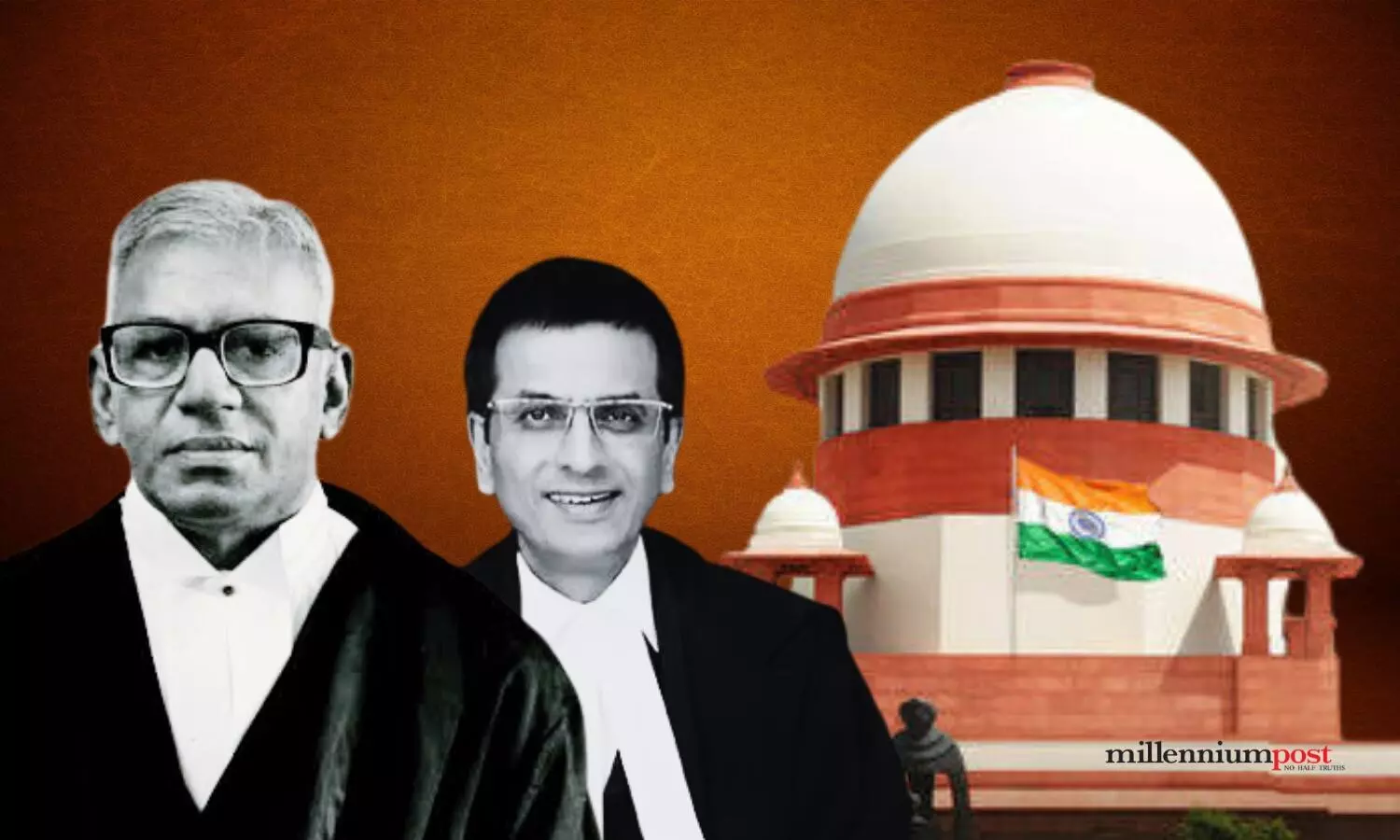Judges oppose CJI Chandrachud’s critique of justice Krishna Iyer doctrine in landmark article 39(b) case

Image: copyright©️ MillenniumPost Graphics
In a recent ruling on Article 39(b) of the Constitution, two Supreme Court judges, Justices B.V. Nagarathna and Sudhanshu Dhulia, voiced strong objections to comments made by Chief Justice of India D.Y. Chandrachud regarding the judicial philosophy of Justice V.R. Krishna Iyer. CJI Chandrachud had described Justice Iyer's approach as doing "a disservice to the broad and flexible spirit of the Constitution,” which sparked disapproval from his colleagues.
Justice Nagarathna labeled CJI Chandrachud's comments as “unwarranted and unjustified,” while Justice Dhulia deemed the criticism “harsh” and “avoidable.” The nine-judge bench, which included CJI Chandrachud and Justices Hrishikesh Roy, B.V. Nagarathna, Sudhanshu Dhulia, J.B. Pardiwala, Manoj Misra, Rajesh Bindal, Satish Chandra Sharma, and Augustine George Masih, was tasked with interpreting whether privately held resources fall under the “material resources of the community” that the State is obligated to manage for public benefit, as mandated by Article 39(b).
CJI Chandrachud, in the majority opinion, departed from Justice Krishna Iyer’s 1978 stance in *State of Karnataka v. Ranganatha Reddy*, which extended the term "material resources of the community" to private property. He also questioned Justice O. Chinnappa Reddy’s endorsement of this view in *Sanjeev Coke Manufacturing Co. vs. Bharat Coking Coal Ltd.*, arguing that this interpretation imposed a rigid economic ideology, potentially misaligned with the Constitution’s broader intent.
In her concurring but critical opinion, Justice Nagarathna disagreed with the assertion that Justice Iyer’s and Justice Chinnappa Reddy’s decisions were shaped by a singular economic ideology. She argued that these jurists had rooted their perspectives in the foundational aspirations of the Constitution’s framers. Justice Nagarathna contended that criticizing past judgments without contextualizing them within their social and economic environments disregards the changing landscape that guided judicial reasoning at the time.
Justice Nagarathna questioned the suitability of disparaging the work of previous judges, observing, “Can we really label past judgments as a disservice merely because they reflect the socio-economic values of their time?” She emphasized that the judiciary must interpret laws to meet contemporary needs but without undermining the legacy of those who shaped India’s legal foundations.
She expressed particular concern over CJI Chandrachud’s reference to a “doctrinal error” in Justice Iyer’s approach, which, in her view, could be misconstrued as a slight against the integrity of past judgments and judges. “The evolution in economic policy post-1991, with reforms favoring liberalization and privatization, does not justify casting aside the perspectives of earlier jurists who ruled in a vastly different context,” she observed. Justice Nagarathna stressed that while legal interpretations evolve, these shifts should not tarnish the legacy of previous judges.
Justice Dhulia, too, voiced his disagreement, acknowledging the Krishna Iyer doctrine’s lasting influence on Indian jurisprudence. He argued that Justice Iyer’s and Justice Chinnappa Reddy’s philosophy was grounded in humanist values that prioritized fairness and equity. According to him, their work has illuminated India’s legal landscape, serving as a touchstone for those committed to justice and compassion.
This debate underscores a complex philosophical divide within the judiciary on interpreting economic and social justice clauses in the Constitution, with CJI Chandrachud advocating for a more restrained approach to state control over private resources, while Justices Nagarathna and Dhulia defend the broader, progressive interpretations established by their predecessors.



